As the popularity of WordPress websites continues to rise, there have been an increasing number of companies, both new and existing, who have decided to step into the arena of managed WordPress hosting. For some companies, it’s been a case of adding new services to an existing repertoire, and for others, it’s has been a case of reinventing the wheel. FlyWheel is one such situation.
As a managed WordPress hosting company that was launched in 2012, Flywheel decided to do things a little differently from the start. Their mission was simple:
To improve the lives of the millions of web designers & developers worldwide that build sites on the WordPress platform.
They sought to accomplish this mission by creating the ultimate combination of great software, solid architecture, and expert support.
Let’s jump in and take a closer look at what FlyWheel has to offer as well as whether or not they’re achieving their mission.
About FlyWheel & Key Differentiators
Don’t get me wrong, I think that if you’re a business owner who is looking for a high quality managed WordPress hosting, FlyWheel is an option worth considering. That said, their core focus is on improving workflow for developers and designers and most of their unique software and systems is built around that core purpose.
If you’ve ever worked on a website for a client, you’ll instantly see the UVP that Flywheel offers. Honestly, I’ve barely started this review and it already looks really cool. Here is a brief summary of what makes FlyWheel unique (don’t worry, I’ll go into more detail in the next section).
- Easy collaboration between you, your team, and your clients
- Organization (team) dashboards
- Simple billing transfer
- Staging of websites and one-click update
- Client demo sites
In addition to these unique features, FlyWheel also offers everything else you’d expect from a managed WordPress host including:
- Free website migration
- Fast WordPress only hosting
- Nightly backups
- Almost air-tight security and free fixes in the event of a breech
- Choose from 10 data centers and use a CDN
- Ticket, telephone and chat support
As you can see, almost all the standard bases are covered and then some. Once you decide to give FlyWheel a try the process is rather simple. I’m going to share my experience with getting started and see if FlyWheel measures up to their sales proposition. Most of my time here will be spent on the unique features. I’m going to assume that you’re already familiar with things like managed backups & automatic WordPress updates.
Quick Managed Hosting Comparison
| Flywheel | WPEngine | Pagely | |
| Installs: | 1 | 1 | 3 |
| Visits / month: | 25,000 | 25,000 | Free |
| Storage: | 10GB | 10GB | 10GB |
| Staging Area: | Included | Included | No |
| Site Migration: | Included | Plugin | Included |
| Backups | One-click backups | Automatic backups | Automatic backups |
| Price: | $30/month | $29/month | $64/month |
| Learn More | Learn More | Learn More |
Getting Started With Flywheel
Getting started with FlyWheel is as easy as visiting their sign-up page, or in my case, being invited to collaborate on an account. Here’s the initial email that I received from FlyWheel after being invited to share account access.
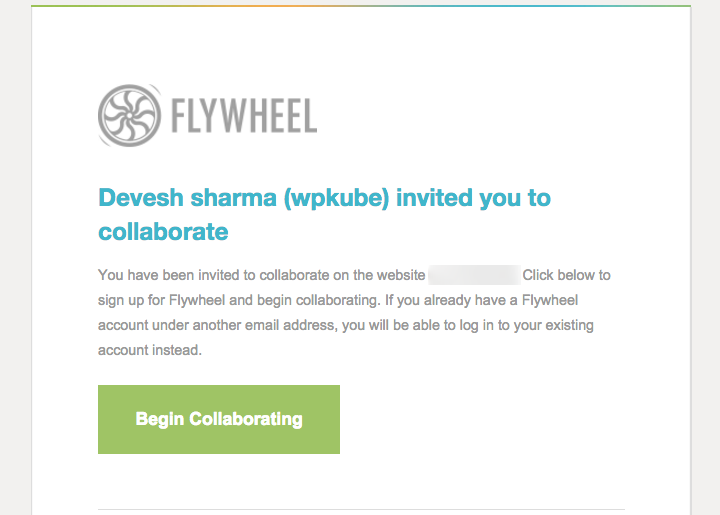
Once you’ve clicked on the link, you’ll be asked to enter some basic personal information, then you’re ready to go. FlyWheel will direct you to your dashboard where you’ll find a list of sites that you can manage plus all the other important dashboard features.
Easy of Use
FlyWheel provides an easy to use dashboard that lists all the websites you have access to as well as your profile details.
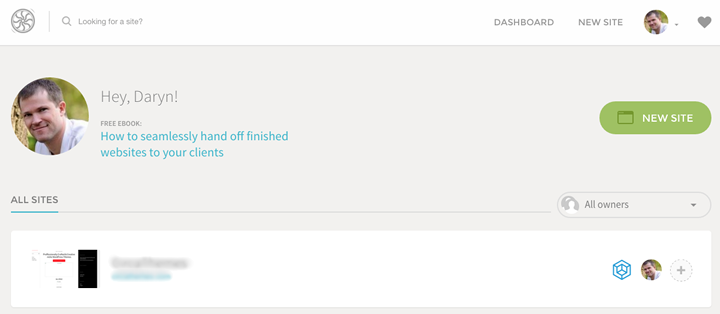
Your profile section contains your personal details, your billing history, and your payment options. It’s nicely organized and easy to find.
On the main section of your dashboard, you’ll find the most important stuff which includes a list of the sites you either own or manage. You’ll also see an option to start a new site.
Clicking on a site in your dashboard opens the website specific settings where you’ll find several key elements including:
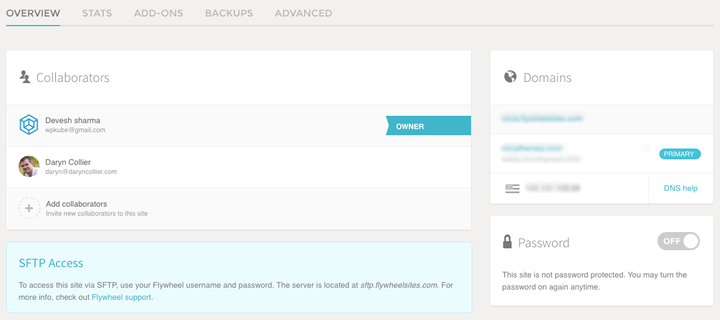
Overview includes a list of collaborators, applicable domain information and whether or not the website is currently password protected.
Stats provides a chart that displays the current total visits for a variety of time frames plus your total storage use and CDN use.
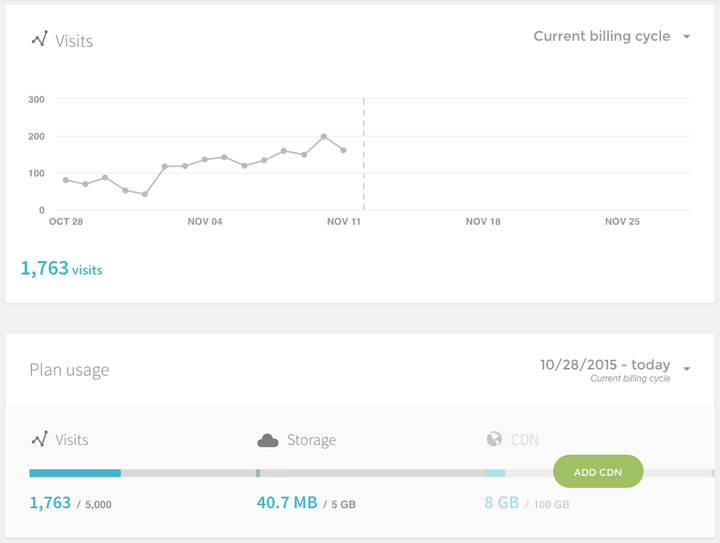
Add-Ons lists your SSL support, CDN, and Multisite Network.
Backups provide a list of each incremental backup along with details like posts, pages, comments, plugins and total uploads. You can also add notes, download a copy, or restore a backup.
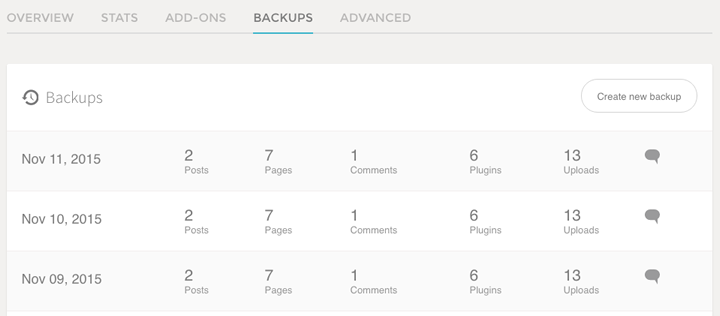
Advanced settings are where you can flush your cache, disable cache during development, enable WP_Debug or export your server logs. You can also modify your database from this screen.
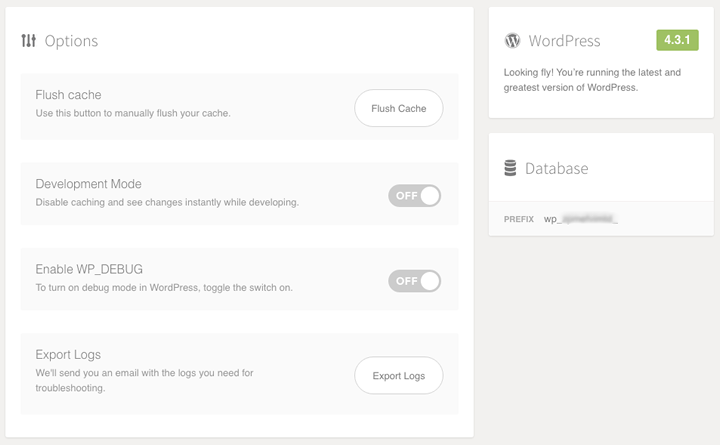
Easy Collaboration
Their simplified collaboration process deals with a major pain point for designers and developers right off the bat – managing and tracking client passwords. It’s something that very quickly becomes a major problem for anyone who has more than a handful of clients.
Managing client passwords and accounts will no longer be a headache.
Flywheel lets you manage collaborators from within your account. Inviting someone is as simple as adding their email address. Once they set up their own free FlyWheel account, they’ll have instant access to the site as well as SFTP access.
The beauty of the software that FlyWheel has created is is that you no longer need to share passwords. You can add coworkers and clients as collaborators and they are able to manage their accounts independently of yours while maintaining full access to the shared site. As the owner, you can remove access at any point in time.
Organizations
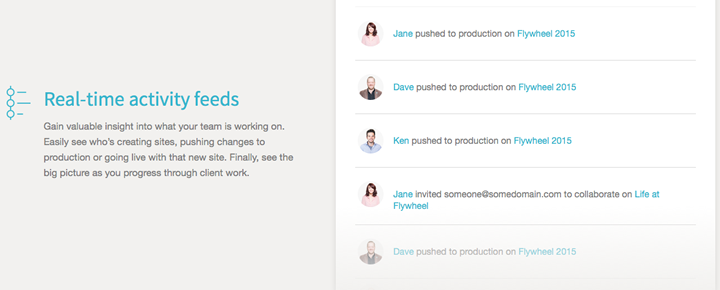
At the time of this review, Organizations is still a private beta feature, but it’s still worth mentioning. This feature is designed to make collaboration even easier for those people working in a team environment. If you have a team of ten people and you’re launching a website for a new client every month or so, it’s inconvenient to invite the same 10 people to every new project.
With organizations, you’ll be able to create a team of people under your agency name. Now, every time you start a new project, you can bring your entire team onboard in one step. It will also let you know anytime a team member performs an action for the client’s account.
Billing Features
Much like accounting, it’s hard to get excited about billing features, but I have to admit, this looks like a pretty convenient and user-friendly system.
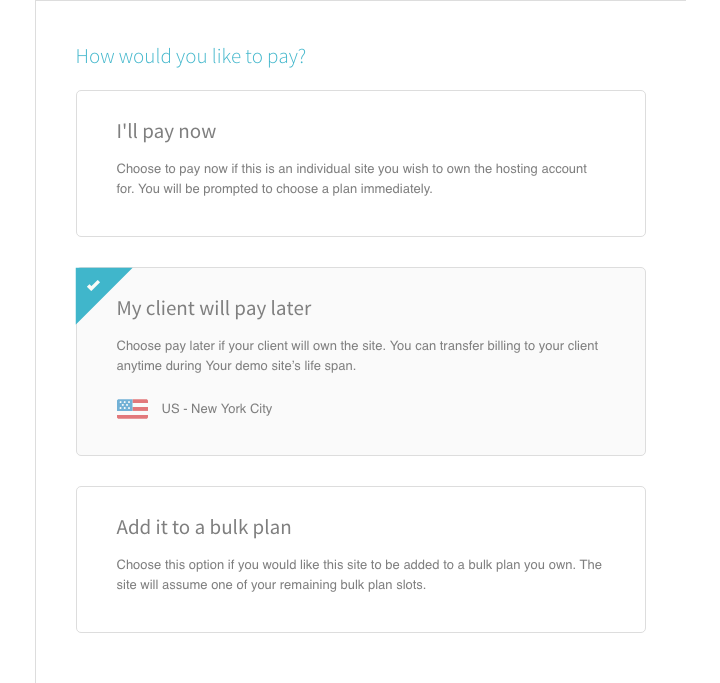
Once your account is verified, either by providing a mobile number or a valid credit card, you’ll be free to set up a new WordPress site. From this point, you can select one of three options:
- You can choose to pay now, setting up an entirely new billing account.
- You can add the site to a bulk plan that you’ve already configured.
- The most convenient option is to create the site now and my client will pay later. This step involves creating a demo site that won’t actually go live until the client has paid for their hosting account. Meaning you can get the entire site set-up on the server and then send an email to your client when it’s ready for review. In order for the site to go live, your client simply pays the hosting bill and you’re ready to go. Demo sites are typically valid for 14 days.
After going through this process with clients on a typical shared server, I can tell you first-hand that this feature alone will save you significant time as well as multiple emails back and forth between your client and your hosting company.
One Account to Rule Them All
It’s a small thing, but it’s a really big deal. If you’re responsible for managing client websites, you probably have a list of SFTP accounts and their corresponding usernames and passwords. With FlyWheel, you only need to manage one login. Every site you own and collaborate on provides SFTP access through your primary login. That’s right – one password – multiple SFTP accounts.
Performance
One thing that FlyWheel does not provide is uptime stats, so we’ll have to do without that particular metric. I ran three tests as follows on a typical WordPress install with a poorly optimized homepage. By poorly optimized, I’m referring to the fact that the primary background image was 5.2MB in size. Realistic? Yep, you see this kind of situation all the time.
The first test from Pingdom was very respectable especially considering the size of the primary background image. You can see that one particular image was responsible for a disproportionate amount of the total page load time. I ran a few different tests with varying results, but this give an accurate representation of what I experienced. Some tests were a little slower and others faster – even under 900ms.
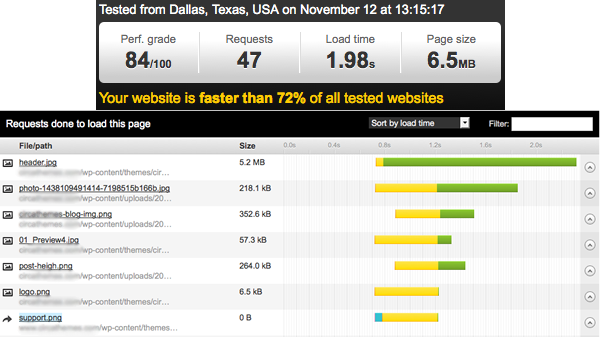
For comparison sake, I ran the same test on GTmetrix and came up with the following results:
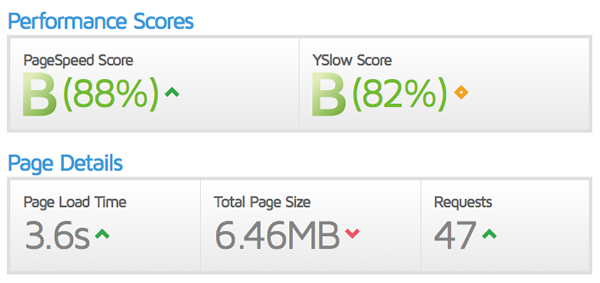
The third test was run using Load Impact. Interpreting these results can be technical (you can find a basic tutorial here) but essentially what we’re looking at is the website’s load time (green line) under an increasing visitor load (blue line) with the obvious objective being relative stability. Again, keep in mind this site is using a huge background image.
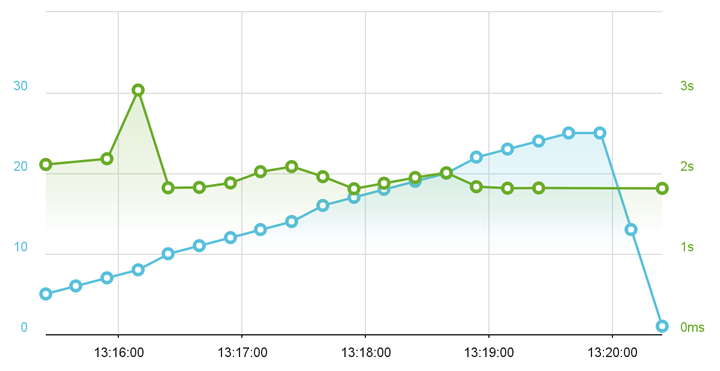
You might be wondering how much faster the load times would have been with a page that was appropriately optimized. Out of curiosity, I ran the same test on an interior page which was much smaller at a hair under 300kB. The results speak for themselves (fast):

Plans, Pricing and Support
FlyWheel essentially offers 2 different plan types. The first is designed for a single WordPress installation for which there are three price points:
- The Tiny Plan starts at $15/month and supports up to 5000 monthly visits, 5GB of disk space and 250GB of bandwidth.
- The Personal Plan is $30/month, includes 25k monthly visits, 10GB of disk space and 500GB of bandwidth.
- The Professional Plan runs $75/month, includes 100k monthly visits, 20GB of disk space and 1TB of bandwidth.
The other plan options that FlyWheel offers are called bulk plans. These are essentially designed for resellers and people who need multiple WordPress installs. There are 2 options:
- The Freelance Plan – $100/month – Provides for up to 10 WordPress installs, 150k monthly visits, 40GB of disk space, and 2TB of bandwidth.
- The Agency Plan – $250/month – Provides for 30 WordPress installs, 600k monthly visits, 120GB of disk space and 8TB of bandwidth.
Additional features like SSL support, CDN and Multisite are all available for a small extra charge per site. And in case none of these options work for you, custom plans are also available.
Support
FlyWheel offers three types of support, email, phone and live chat. Although I didn’t really have a specific need for support, I did fire off a quick question just to see how long it took to get a reply. When I tried the chat at 12PST it was down so I resorted to email. I had a response to my question in exactly 11 minutes which is a great response time in my books.
Final Thoughts
Dare I say it was refreshing to spend time reviewing a hosting site that didn’t try overwhelm me with technical jargon. FlyWheel Managed WordPress hosting is fast, and so it should be at a premium price point. They offer all the features you’d expect, but where they really excelled, in my opinion, is the well-designed user experience with features that actually make your life easier.
End users don’t need every technical detail about their website hosting. What they need to know is that it’s fast, works well, and is reliable. If you take those three things, package them up in an easy to use interface with great features, and toss in great customers service, you’ve got a winner.
If you interested in giving FlyWheel a try, we’ve got a 20% off coupon available for you as well or just use the code flykube.

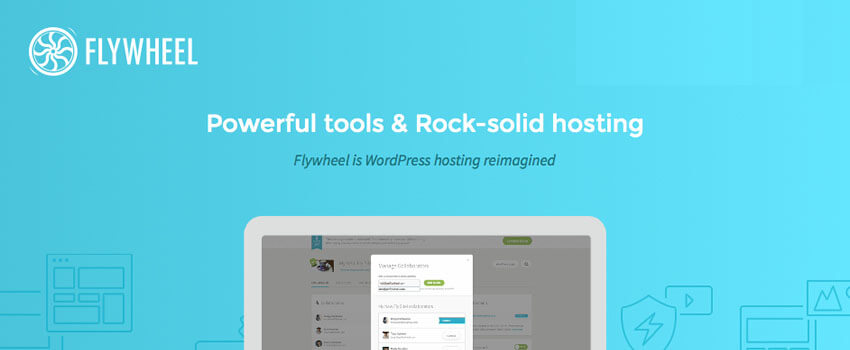







Dear Daryn,
Nice post but you should really recheck the “Quick Managed Hosting Comparison” table because it has many errors such as:
1. Pagely does NOT provide staging URL feature for the plan that you mention.
2. What does ‘Y’ mean for installs at WP Engine? Sounds like a typo.
3. Site migration is not included for all of them for free.
4. Backups are quite different for each one of those plans
Regards,
Stavros
Thanks for the heads up Stavros,
It looks like maybe the second column was duplicated except for price. It should be sorted now.
Cheers,
Daryn
Dear Daryn,
You are welcome.
I confirm that it looks much better now.
Have a great weekend.
Regards,
Stavros
I agree that Flywheel is a solid solution – until you decide to move to get even higher performance or a better price! Their lack of support in letting you know how different their setup is and what to watch for when you move may/will prove an enormous headache.
They run nginx servers (being basically an amazon reseller with their proprietary admin interface) and have many un-obvious files in place that overwrite fixes you put in place to run on an apache server. Yup, Flywheel files after moving, act like you’ve been hacked!
So? Big boys should know right? Except I specifically asked them for tips on hidden gotchas like this. “oh no just download the backups and install” Sloppy at best, willfully negligent at worst.
Moved 47 sites; to have many blowing up and upset clients calling and getting the sites fixed only to have them reset every have hour and go dark again was not fun! Flywheel knows this is something to watch for – be very careful if/when you leave! Check your wp-config and wp-settings files.
Agreed 100% annoying these hosts putting fancy names on basic tech like SUPERFLY–CACHE or b.s. like that when they are just running Nginx FastCGI Cache etc…
Flywheel free migrations is one of the things they have better than others. but
still prefer my own custom Nginx VPS on Vultr or Linode or have used LittleBizzy to manage a few of my sites previously on Vultr, who are fast hardware (Intel CPUs).
Plus LittleBizzy lets you choose any datacenter in the world good for Aussie clients especially.
That is a great point.
I am looking into WP Managed hosting because of unrelenting hacking attacks and I realize how much time I put into managing all the backend stuff with my non-managed host. But these new hosts like Flywheel and Kinsta are very different that the traditional host. Many of my plug ins are redundant because they do them.
I think this issue of migrating away from them is a common issue among them. Although how much they differ in particular on this can’t claim to know.
They are not really a “managed host” for WP. Their chat support rarely knows what they’re doing, they’re basically a glorified “New Ticket” service. You can’t do basic WP stuff like edit wp-config.php. You can’t get refunded any amount for downtime, they’ll just tell you “the site wasn’t down” and no matter how much proof you give, they’ll blow you off. And, they jacked the price up on me by $500 / year with no warning and nothing I could do about it. Except, move to SiteGround, which I did.
Downloaded Flywheel to support WordPress. Absolutely the worst product and support I can remember! The free Flywheel comes with NO support from the company. The “support” is community-based and therefore for one issue there are a multitude of answers. There are so many “bugs” for the lay-user that confusion is and understatement. Hence, one can spend an inordinate amount of time doing “work-arounds”, and still not get it to mess.
Too, the program Oracle VisusalBox is downloaded with the Flywheel program. As a lay-computer user, I have spend hours trying to uninstall this program to no avail. Do not expect any significant help from Flywheel. I am stuck with it until I can take my computer to the shop.
I can not recommend Flywheel Software to anyone.
I have used fly by wheel but it can’t run on my pc there is some issue. Can you guide me.thanks